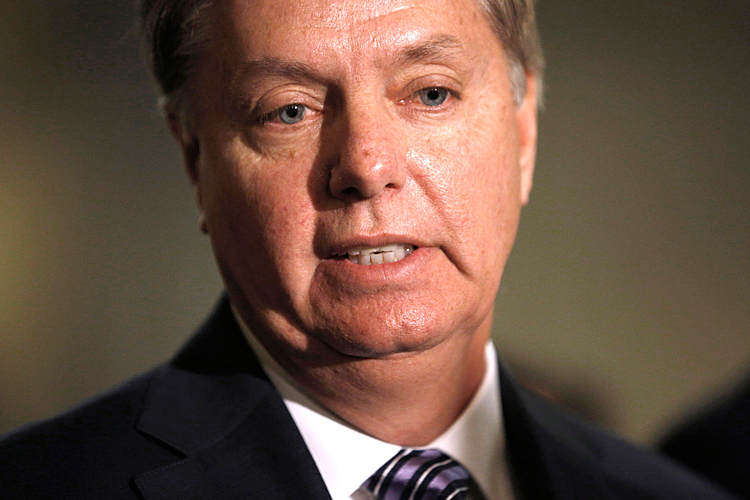Senator Lindsey Graham entered the presidential race yesterday. Unless something dramatic happens, he will be sworn in as president in January 2017. Wait. No? The opposite of that. Unless something dramatic happens, Lindsey Graham will not be sworn in as president in January 2017. Yes.
Graham’s candidacy does seem poised, though, for one of those waves of boosterism in the mainstream media that translates into precisely zero increased support among Republican primary voters. (Hi, Jon Huntsman!) Political reporters and writers like Lindsey Graham. He’s a character. He’s good for a quote and he’s not afraid to tell off the Tea Party when it goes off on one of its quixotic tactical quests to use government spending or debt ceiling deadlines to extract unrealistic concessions. He also supports comprehensive immigration reform and, even more rarely for a member of his party, doesn’t think that the environment should be destroyed as an public policy goal in and of itself.
What’s the word? “Pragmatism” — yes. This is the one that the New York Times in its write-up of Graham’s launch, the one that will set the Joe Scarborough Wing of the party’s hearts aflutter for however long Graham goes through with this thing:
Mr. Graham entered the race a year after his political career appeared briefly to be on the ropes, when Tea Party conservatives portrayed him as a moderate and tried to force him out of the Senate.
After fending off that challenge with ease, Mr. Graham, 59, has said his fear that the world is “exploding in terror and violence” inspired him to run for the White House. He will try to convince voters that a platform of pragmatism at home and “security through strength” abroad is the formula to give Republicans the best chance to beat Hillary Rodham Clinton if she becomes the Democratic nominee.
“I want to be president to protect our nation that we all love so much from all threats foreign and domestic,” he told about 1,200 supporters assembled in his hometown. “So get ready. I know I’m ready.
There are a couple of ways to look at Lindsey Graham’s primary in 2014. First there’s the Graham view echoed in this piece, that he “[fended] off that challenge with ease.” Indeed, he bested his nearest competitor by 41 points. This would support his assertion that if you’re just honest about your heretical positions with the Republican base, they’ll appreciate that and come around. But he only was able to fend off that challenge with ease because his challengers made it so easy on him. Graham was so despised by the Republican base for his supposed RINOism that too many challengers ran against him and divvied up the protest vote. Graham might have launched his presidential campaign yesterday as an ex-senator had Tea Party groups gotten their act together and coalesced around a single competent candidate.
Graham is able to surmount his domestic “pragmatism” deficit with the Republican base through his astonishingly hawkish views on foreign policy. (Hawkish foreign policy views which tend to align with vastly increased military spending, which tends to align with more money for South Carolina defense contractors, FWIW.)
Though Graham may brag about how much enjoys taking it to the Tea Party on domestic issues, we’re more likely to hear him on the trail sticking to his base-friendly comfort zone of reckless warmongering. He wants to send troops to fight the Islamic State in Iraq and Syria. Once all disaffected Sunnis in the Middle East are eliminated, he will keep troops in Iraq indefinitely. In Syria, then, he will turn to forcibly overthrowing the Assad regime and doing something-or-another to rebuild that country from scratch. He will send made-in-South-Carolina weaponry to basically any group abroad that doesn’t like the same people he dislikes. He will bomb Iran. He will take “violent” (or is it virulent?) action against the United Nations, and he will “call a drone” on anyone who for even a fleeting moment “thinks” about joining ISIS. Graham likes to go on about how he has more foreign policy experience than anyone else in the field. He’s right, and that’s Exhibit A for why experience isn’t everything in a presidential contest.
All of which is to say that we’re not quite sold on the prospect of Pragmatic Republican President Lindsey Graham, especially when the executive branch’s control over foreign policy is much stronger than its ability to dictate domestic policy. I don’t see President Graham possessing enough political capital to squeeze a cap-and-trade or carbon tax bill out of the Republican Congress or convincing House Republicans to support a path to citizenship for undocumented immigrants. I can, however, see President Graham issuing an order on day one to permanently send American ground troops to Iraq, Syria, Ukraine, Russia, China, Iran, Afghanistan, North Korea, Libya, Egypt, Yemen, and all the other countries.

